Overview of Corporate Governance Issues for Co-operatives - IFC
Overview of Corporate Governance Issues for Co-operatives - IFC
Overview of Corporate Governance Issues for Co-operatives - IFC
Create successful ePaper yourself
Turn your PDF publications into a flip-book with our unique Google optimized e-Paper software.
This has been aptly described as a system <strong>of</strong> co-<strong>operatives</strong> without co-operators. Thereis an extensive literature on the ways in which co-<strong>operatives</strong> were provided with specialsupport and <strong>of</strong>ten af<strong>for</strong>ded monopoly positions. They frequently became sole suppliersto State Marketing Boards <strong>for</strong> commodity crops and were subject to price controls. Inmany cases co-<strong>operatives</strong> also became vehicles <strong>for</strong> political patronage and nepotismand were subject to capture by local elites. <strong>Co</strong>-operative ministries had the power to,and frequently did, intervene in board matters by appointing directors and managers,controlling all business operations and making membership <strong>of</strong> a co-operativecompulsory. The detrimental effects <strong>of</strong> these interventionist policies have been welldocumented. However, as a seminal World Bank study on co-<strong>operatives</strong> pointed out,these policies were in part the result <strong>of</strong> donor support (Hussi et al 1993). Indeed evenwithin the co-operative movement, there was support <strong>for</strong> a directive and even coerciverole <strong>for</strong> governments vis-a-vis co-<strong>operatives</strong> in developing countries (ICA 1966).This situation began to change with the advent <strong>of</strong> Structural Adjustment Programmesand related liberalisation programmes. Their impact has been considerable if unevenand in many countries liberalisation <strong>for</strong> the co-operative is still in its early stages. InAfrica, single-channel marketing systems and regional parastatals were dismantled,many co-<strong>operatives</strong> stopped receiving product or credit subsidies. Trade liberalisationpolicies placed sudden and considerable burden on many co-<strong>operatives</strong> by exposingthem suddenly to high levels <strong>of</strong> competition whilst at the same time they lost marketaccess. <strong>Co</strong>-<strong>operatives</strong> frequently lost their pre-eminent position in the economy andfaced the problem <strong>of</strong> restructuring with fewer resources (ILO 2000).A new balance between the power and role <strong>of</strong> the State with the co-operative has yet tobe reached in many countries. To aid this process, a major revision was undertaken bythe ILO <strong>of</strong> its earlier Recommendation on the Promotion <strong>of</strong> <strong>Co</strong>-<strong>operatives</strong>. The aim wasto provide an appropriate framework which was universal in its application, recognisedco-<strong>operatives</strong> as private sector institutions controlled by their members and operatedwithin competitive markets whilst sustaining their identity (ILO 2000). In 2002, thepassage <strong>of</strong> Recommendation 193 provided an international framework based on theICA 1995 Statement <strong>of</strong> Identity and Principles. A key feature is the emphasis on the role<strong>of</strong> governments in providing an enabling rather than a controlling framework, respectingthe autonomy <strong>of</strong> co-<strong>operatives</strong> and ensuring they receive equal treatment with other<strong>for</strong>ms <strong>of</strong> private sector enterprises.The impact <strong>of</strong> the Recommendation has yet to be comprehensively assessed. The ILOhas listed activities carried out since 2002 linked to the Recommendation, the majority<strong>of</strong> which have been in developing countries. Legal and policy changes have occurred inmore than 30 countries (ILO 2006). Both China and India, <strong>for</strong> example, are currently inthe process <strong>of</strong> legislative and policy revisions in the light <strong>of</strong> Recommendation 193.The ILO also developed a revised set <strong>of</strong> Guidelines <strong>for</strong> <strong>Co</strong>operative Legislation. Theypropose that cooperative legislation needs to be situated in private not public law toreflect the fact that the legislature should not seek public involvement in the activities <strong>of</strong>Page 18


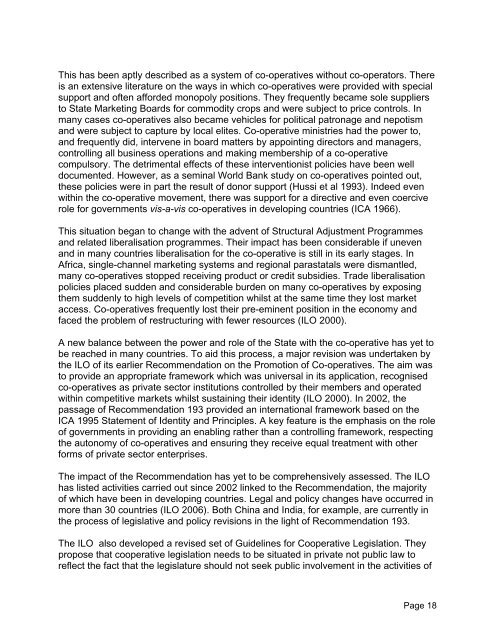
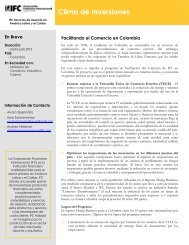
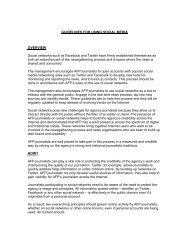
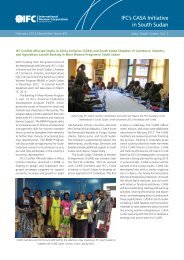
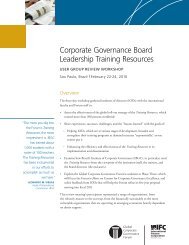

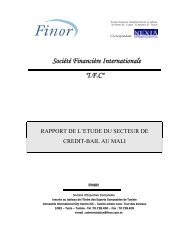
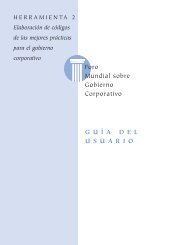

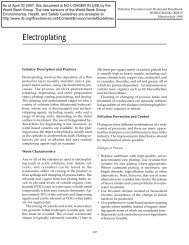

![Print a two-page fact sheet on this project [PDF] - IFC](https://img.yumpu.com/43449799/1/190x245/print-a-two-page-fact-sheet-on-this-project-pdf-ifc.jpg?quality=85)


